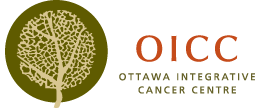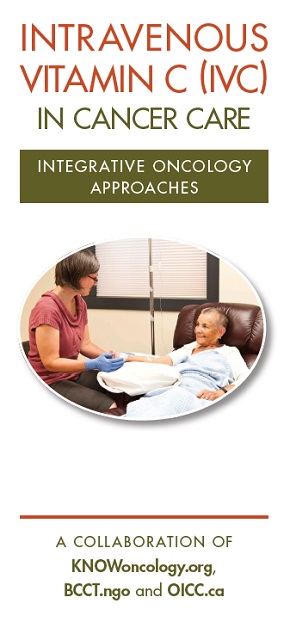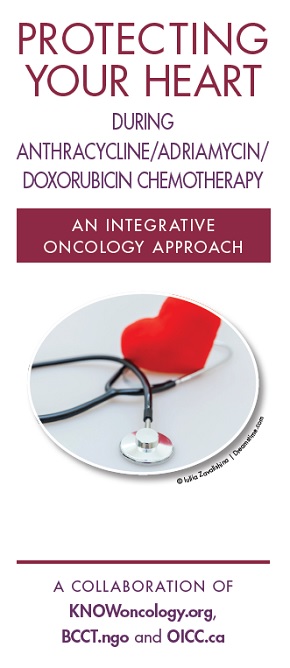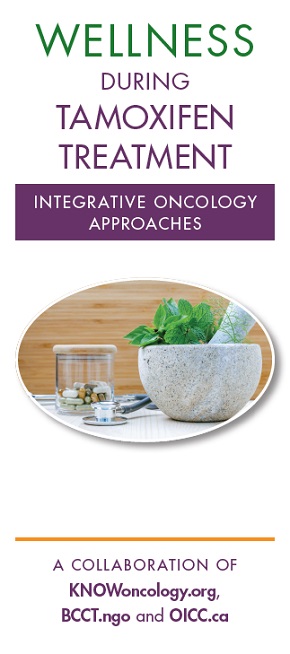Patient Education Brochures
These patient education handouts have been created by a collaboration among BCCT, Oncology Association of Naturopathic Physicians, KNOW Oncology and the Ottawa Integrative Cancer Centre.
 |
 |
 |
 |
Intravenous Vitamin C (IVC) in Cancer Care: Integrative Oncology Approaches
|
Click the image to open the brochure. |
References
- Padayatty SJ, Sun H et al. Vitamin C pharmacokinetics: implications for oral and intravenous use. Annals of Internal Medicine 2004;140(7):533-7.
- Monti DA, Mitchell E et al. Phase I evaluation of intravenous ascorbic acid in combination with gemcitabine and erlotinib in patients with metastatic pancreatic cancer. PLoS One. 2012;7(1):e29794.
- Klimant E, Wright H, Rubin D, Seely D, Markman M. Intravenous vitamin C in the supportive care of cancer patients: a review and rational approach. Current Oncology. 2018;25(2):139-48.
- Stephenson CM, Levin RD, Spector T, Lis CG. Phase I clinical trial to evaluate the safety, tolerability, and pharmacokinetics of high-dose intravenous ascorbic acid in patients with advanced cancer. Cancer Chemotherapy and Pharmacology. 2013;72(1):139-46.
- Welsh JL, Wagner BA, van’t Erve TJ, et al. Pharmacological ascorbate with gemcitabine for the control of metastatic and node-positive pancreatic cancer (PACMAN): results from a phase I clinical trial. Cancer Chemotherapy and Pharmacology. 2013;71(3):765-75.
- Hoffer LJ, Levine M et al. Phase I clinical trial of i.v. ascorbic acid in advanced malignancy. Annals of Oncology. 2008;19(11):1969-74.
- Alexander MS, Wilkes JG et al. Pharmacological ascorbate reduces radiation-induced normal tissue toxicity and enhances tumor radiosensitization in pancreatic cancer. Cancer Research. 2018;78(24):6838-51.
- Schoenfeld JD, Sibenaller ZA et al. O2⋅- and H2O2-mediated disruption of Fe metabolism causes the differential susceptibility of NSCLC and GBM cancer cells to pharmacological ascorbate. Cancer Cell. 2017;31(4):487-500.e8.
- Hoffer LJ, Robitaille L et al. High-dose intravenous vitamin C combined with cytotoxic chemotherapy in patients with advanced cancer: a phase I-II clinical trial. PLOS One. 2015;10(4):e0120228-e28.
- Nielsen TK, Hojgaard M et al. Weekly ascorbic acid infusion in castration-resistant prostate cancer patients: a single-arm phase II trial. Translational Andrology and Urology. 2017;6(3):517-28.
- Mikirova N, Casciari J, Riordan N, Hunninghake R. Clinical experience with intravenous administration of ascorbic acid: achievable levels in blood for different states of inflammation and disease in cancer patients. Journal of Translational Medicine. 2013;11(1):191.
- Polireddy K, Dong R, Reed G, et al. High dose parenteral ascorbate inhibited pancreatic cancer growth and metastasis: mechanisms and a phase I/IIa study. Scientific Reports. 2017;7(1):17188 .
- Mikirova N, Riordan N, Casciari J. Modulation of cytokines in cancer patients by intravenous ascorbate therapy. Medical Science Monitor. 2016;22:14-25.
- Ma Y, Chapman J et al. High-dose parenteral ascorbate enhanced chemosensitivity of ovarian cancer and reduced toxicity of chemotherapy. Science Translational Medicine. 2014;6(222):222ra18-22ra18.
- Yeom CH, Jung GC, Song KJ. Changes of terminal cancer patients' health-related quality of life after high dose vitamin C administration. Journal of Korean Medical Science 2007;22(1):7-11.
- Kawada H, Sawanobori M et al.Phase I clinical trial of intravenous L-ascorbic acid following salvage chemotherapy for relapsed B-cell non-Hodgkin's lymphoma. Tokai Journal of Experimental and Clinical Medicine. 2014;39(3):111-5.
- Ou J, Zhu X et al. A phase I-II clinical trial to evaluate the safety, pharmacokinetics and efficacy of high dose intravenous ascorbic acid synergy with mEHT in Chinese patients with stage III-IV non-small cell lung cancer. Annals of Oncology. 2017;28:iii12‐iii13.
- Mayland CR, Bennett MI, Allan K. Vitamin C deficiency in cancer patients. Palliative Medicine. 2005;19(1):17-21
- Fain O, Mathieu E, Thomas M. Scurvy in patients with cancer. BMJ. 1998;316(7145):1661-2.
- Mashour S, Turner JF Jr, Merrell R. Acute renal failure, oxalosis, and vitamin C supplementation: a case report and review of the literature. Chest. 2000;118(2):561-3.
- Canavese C, Petrarulo M et al. Long-term, low-dose, intravenous vitamin C leads to plasma calcium oxalate supersaturation in hemodialysis patients. American Journal of Kidney Diseases. 2005;45(3):540-9.
- Rees DC, Kelsey H, Richards JD. Acute haemolysis induced by high dose ascorbic acid in glucose-6-phosphate dehydrogenase deficiency. BMJ. 1993;306(6881):841-2.
- Mehta JB, Singhal SB, Mehta BC. Ascorbic-acid-induced haemolysis in G-6-PD deficiency. Lancet. 1990;336(8720):944.
- Auer BL, Auer D, Rodgers AL. Relative hyperoxaluria, crystalluria and haematuria after megadose ingestion of vitamin C. European Journal of Clinical Investigation. 1998;28(9):695-700.
- Riordan HD, Casciari JJ et al. A pilot clinical study of continuous intravenous ascorbate in terminal cancer patients. Puerto Rico Health Sciences Journal. 2005;24(4):269-76.
- Ma Y, Sullivan GG et al. A convenient method for measuring blood ascorbate concentrations in patients receiving high-dose intravenous ascorbate. Journal of the American College of Nutrition. 2013;32(3):187-93.
- Barton JC, McDonnell SM et al. Management of hemochromatosis. Hemochromatosis Management Working Group. Annals of Internal Medicine. 1998;129(11):932-9.
- Sattar A, Willman JE, Kolluri R. Possible warfarin resistance due to interaction with ascorbic acid: case report and literature review. American Journal of Health-System Pharmacy. 2013;70(9):782-6.
-
van Gorkom GNY, Lookermans EL, Van Elssen CHMJ, Bos GMJ. The effect of vitamin C (ascorbic acid) in the treatment of patients with cancer: a systematic review. Nutrients. 2019;11(5):977.
Protecting Your Heart during Anthracycline / Adriamycin / Doxorubicin Chemotherapy: An Integrative Oncology Approach
|
Click the image to open the brochure. |
References
- Armenian SH: Anthracycline-induced cardiotoxicity in young cancer patients: the role of carnitine. Annals of Nutrition & Metabolism. 2016;68(suppl 3):10-14.
- de Azambuja E. Cardiotoxicity in Oncology Practice; European Society for Medical Oncology. Viewed October 5, 2019.
- Stenger, M. ASCO Clinical Practice Guideline on Prevention and Monitoring of Cardiac Dysfunction in Survivors of Adult Cancers. April 10, 2017. Viewed October 5, 2019.
- Asnani A, Neilan T, Tripathy D, Scherrer-Crosbie, M. Clinical manifestations, monitoring, and diagnosis of anthracycline-induced cardiotoxicity. July 17, 2019. Viewed October 5, 2019.
- National Comprehensive Cancer Network. Anthracycline Induced Cardiotoxicity (Version 2.2019). Viewed October 5, 2019.
- Children’s Oncology Group Survivorship Guidelines. Heart Health (Version 4.0) p 1-6. Keeping Your Heart Healthy after Treatment for Childhood Cancer. Viewed October 5, 2019.
- Ma Y, Bai F et al. Beta-blockers for the primary prevention of anthracycline-induced cardiotoxicity: a meta-analysis of randomized controlled trials. BMC Pharmacology and Toxicology. 2019;20(1):18.
- Pole L, Hepp N. Eating Well. Beyond Conventional Cancer Therapies. June 10, 2019. Viewed October 7, 2019.
- Pole L, Hepp N. Moving More. Beyond Conventional Cancer Therapies. September 12, 2019. Viewed October 7, 2019.
- Pole L, Hepp N. Managing Stress. Beyond Conventional Cancer Therapies. September 26, 2019. Viewed October 7, 2019.
- Pole L, Hepp N. Sleeping Well. Beyond Conventional Cancer Therapies. July 19, 2019. Viewed October 7, 2019.
- Pole L, Hepp N. Sharing Love and Support. Beyond Conventional Cancer Therapies. May 1, 2019. Viewed October 7, 2019.
- Hepp N, Pole L. 7 Healing Practices. Beyond Conventional Cancer Therapies. Viewed October 7, 2019.
- Hornsby WE, Douglas PS, West MJ, et al. Safety and efficacy of aerobic training in operable breast cancer patients receiving neoadjuvant chemotherapy: a phase II randomized trial. Acta Oncologica. 2014 Jan;53(1):65-74.
- Kirkham AA, Paterson DI et al. Rationale and design of the Caloric Restriction and Exercise protection from Anthracycline Toxic Effects (CREATE) study: a 3-arm parallel group phase II randomized controlled trial in early breast cancer. BMC Cancer. 2018;18(1):864; Kirkham AA, Ian Paterson D et al. Correction to: Rationale and design of the Caloric Restriction and Exercise protection from Anthracycline Toxic Effects (CREATE) study: a 3-arm parallel group phase II randomized controlled trial in early breast cancer. BMC Cancer. 2019 Jan 15;19(1):75.
- Gray B, Ingles J, Medi C, Driscoll T, Semsarian C. Cardiovascular effects of energy drinks in familial long qt syndrome: a randomized cross-over study. International Journal of Cardiology. 2017 Mar 15;231:150–154.
- Milajerdi A, Namazi N, Larijani B, Azadbakht L. The association of dietary quality indices and cancer mortality: a systematic review and meta-analysis of cohort studies. Nutrition and Cancer. 2018 Oct 15:1–15.
- Pole L, Hepp N. Quality and Sources of Herbs, Supplements and Other Natural Products. Beyond Conventional Cancer Therapies. October 4, 2019.
- Hagag A, El Shehaby W, El-Abasy A, Mabrouk M. Protective role of silymarin in early doxorubicin-induced cardiac dysfunction in children with acute lymphoblastic leukemia. Infectious Disorders Drug Targets. 2019;19(2):133-140.
- Goey AK, Mooiman KD, Beijnen JH, Schellens JH, Meijerman I. Relevance of in vitro and clinical data for predicting CYP3A4-mediated herb-drug interactions in cancer patients. Cancer Treatment Reviews. 2013 Nov;39(7):773-83.
- Ladas EJ, Kroll DJ, Oberlies NH, et al. A randomized, controlled, double-blind, pilot study of milk thistle for the treatment of hepatotoxicity in childhood acute lymphoblastic leukemia (ALL). Cancer. 2010;116(2):506–513.
- Iarussi D, Auricchio U et al. Protective effect of coenzyme Q10 on anthracyclines cardiotoxicity: control study in children with acute lymphoblastic leukemia and non-Hodgkin lymphoma. Molecular Aspects of Medicine. 1994;15 (Suppl):s207–s212.
- Takimoto M, Sakurai T et al. Protective effect of CoQ 10 administration on cardial toxicity in FAC therapy. [Article in Japanese]. Gan To Kagaku Ryoho. 1982 Jan;9(1):116–121.
- Okuma K, Furuta I, Ota K. Protective effect of coenzyme Q10 in cardiotoxicity induced by adriamycin. [Article in Japanese]. Gan To Kagaku Ryoho. 1984 Mar;11(3):502–508.
- Yi SY, Nan KJ, Chen SJ. Effect of extract of Ginkgo biloba on doxorubicin-associated cardiotoxicity in patients with breast cancer. [Article in Chinese]. Zhongguo Zhong Xi Yi Jie He Za Zhi. 2008 Jan;28(1):68–70.
- Markowitz J, Donovan J, DeVane C, et al. Multiple-dose administration of Ginkgo biloba did not affect cytochrome P-450 2D6 or 3A4 activity in normal volunteers. Journal of Clinical Psychopharmacology. 2003 Dec;23(6):576–581.
- Vardy J, Dhillon HM et al. Investigation of herb-drug interactions with ginkgo biloba in women receiving hormonal treatment for early breast cancer. Springerplus. 2013;2(1):126.
- Gardner C, Zehnder J et al. Effect of Ginkgo biloba (EGb 761) and aspirin on platelet aggregation and platelet function analysis among older adults at risk of cardiovascular disease: a randomized clinical trial. Blood Coagulation and Fibrinolysis. 2007 Dec;18(8):787–793.
- Wolf H. Does Ginkgo biloba special extract EGb 761 provide additional effects on coagulation and bleeding when added to acetylsalicylic acid 500 mg daily? Drugs in R&D. 2006;7(3):163–172.
- Moreno-Vega A. Vega-Riveroll L, Ayala T. Adjuvant effect of molecular iodine in conventional chemotherapy for breast cancer. randomized pilot study. Nutrients 2019;11(7):1623.
- DiNicolantonio J, Lavie C et al. L-carnitine in the secondary prevention of cardiovascular disease: systematic review and meta-analysis. Mayo Clinic Proceedings. 2013 Jun; 88(6): 544–551.
- Waldner R, Laschan C et al. Effects of doxorubicin-containing chemotherapy and a combination with L-carnitine on oxidative metabolism in patients with non-Hodgkin lymphoma. Journal of Cancer Research and Clinical Oncology. 2006 Feb; 132(2): 121–128.
- Hershman DL, Unger JM et al. Two-year trends of taxane-induced neuropathy in women enrolled in a randomized trial of acetyl-l-carnitine (SWOG s0715). Journal of the National Cancer Institute. 2018;110(6):669–676.
- Skrypnyk I, Maslova G, Lymanets T, Gusachenko I. L-arginine is an effective medication for prevention of endothelial dysfunction, a predictor of anthracycLine cardiotoxicity in patients with acute leukemia. Experimental Oncology. 2017;39(4):308–311.
- Schulman S, Becker L et al. L-arginine therapy in acute myocardial infarction: the Vascular Interaction With Age in Myocardial Infarction (VINTAGE MI) randomized clinical trial. JAMA. 2006 Jan 4; 295(1): 58–64.
- Huang C, Chang H et al. Traditional Chinese medicine is associated with a decreased risk of heart failure in breast cancer patients receiving doxorubicin treatment. Journal of Ethnopharmacology. 2019 Jan 30;229:15-21.
Wellness during Tamoxifen Treatment: Integrative Oncology Approaches
|
Click the image to open the brochure. |
References
- Pole L, Hepp N. Quality and Sources of Herbs, Supplements and Other Natural Products. Beyond Conventional Cancer Therapies. October 4, 2019.
- Meneses-Echávez JF, González-Jiménez E, Ramírez-Vélez R. Effects of supervised exercise on cancer-related fatigue in breast cancer survivors: a systematic review and meta-analysis. BMC Cancer. 2015 Feb 21;15:77.
- Stagl JM, Lechner SC et al. A randomized controlled trial of cognitive-behavioral stress management in breast cancer: survival and recurrence at 11-year follow-up. Breast Cancer Research and Treatment. 2015 Nov;154(2):319-28.
- Eleftheriou D, Benetou V, Trichopoulou A, La Vecchia C, Bamia C. Mediterranean diet and its components in relation to all-cause mortality: meta-analysis. British Journal of Nutrition. 2018 Nov;120(10):1081-1097.
- Greenlee H, DuPont-Reyes MJ et al. Clinical practice guidelines on the evidence-based use of integrative therapies during and after breast cancer treatment. CA: A Cancer Journal for Clinicians. 2017 May 6;67(3):194-232.
- Chi F, Wu R et al. Post-diagnosis soy food intake and breast cancer survival: a meta-analysis of cohort studies. Asian Pacific Journal of Cancer Prevention. 2013;14(4):2407-12.
- Caan BJ, Natarajan L et al. Soy food consumption and breast cancer prognosis. Cancer Epidemiology, Biomarkers & Prevention. 2011 May;20(5):854-8.
- Zhang FF, Haslam DE et al. Dietary isoflavone intake and all-cause mortality in breast cancer survivors: the Breast Cancer Family Registry. Cancer. 2017 Jun 1;123(11):2070-2079; Qiu S, Jiang C. Soy and isoflavones consumption and breast cancer survival and recurrence: a systematic review and meta-analysis. European Journal of Nutrition. 2018 Oct 31.
- Nechuta SJ, Caan BJ et al. Soy food intake after diagnosis of breast cancer and survival: an in-depth analysis of combined evidence from cohort studies of US and Chinese women. American Journal of Clinical Nutrition. 2012 Jul;96(1):123-32;
- Qiu S, Jiang C. Soy and isoflavones consumption and breast cancer survival and recurrence: a systematic review and meta-analysis. European Journal of Nutrition. 2018 Oct 31.
- Yan Z, Zhang X, Li C, Jiao S, Dong W. Association between consumption of soy and risk of cardiovascular disease: a meta-analysis of observational studies. European Journal of Preventive Cardiology. 2017 May;24(7):735-747.
- Thomson CA, Rock CL et al. Vegetable intake is associated with reduced breast cancer recurrence in tamoxifen users: a secondary analysis from the Women's Healthy Eating and Living Study. Breast Cancer Research and Treatment. 2011 Jan;125(2):519-27.
- Gianfredi V, Nucci D et al. Green tea consumption and risk of breast cancer and recurrence-a systematic review and meta-analysis of observational studies. Nutrients. 2018 Dec 3;10(12). pii: E1886; Yiannakopoulou EC. Interaction of green tea catechins with breast cancer endocrine treatment: a systematic review. Pharmacology. 2014;94(5-6):245-8.
- Hansen MV, Andersen LT et al. Effect of melatonin on depressive symptoms and anxiety in patients undergoing breast cancer surgery: a randomized, double-blind, placebo-controlled trial. Breast Cancer Research and Treatment. 2014 Jun;145(3):683-95.
- Lissoni P, Barni S et al. Modulation of cancer endocrine therapy by melatonin: a phase II study of tamoxifen plus melatonin in metastatic breast cancer patients progressing under tamoxifen alone. British Journal of Cancer. 1995 Apr;71(4):854-6.
- Innominato PF, Lim AS et al. The effect of melatonin on sleep and quality of life in patients with advanced breast cancer. Supportive Care in Cancer. 2016 Mar;24(3):1097-105.
- Yuvaraj S, Premkumar VG, Vijayasarathy K, Gangadaran SG, Sachdanandam P. Ameliorating effect of coenzyme Q10, riboflavin and niacin in tamoxifen-treated postmenopausal breast cancer patients with special reference to lipids and lipoproteins. Clinical Biochemistry. 2007 Jun;40(9-10):623-8; Yuvaraj S, Premkumar VG, Vijayasarathy K, Gangadaran SG, Sachdanandam P. Augmented antioxidant status in tamoxifen treated postmenopausal women with breast cancer on co-administration with coenzyme Q10, niacin and riboflavin. Cancer Chemotherapy and Pharmacology. 2008 May;61(6):933-41; Yuvaraj S1, Premkumar VG, Shanthi P, Vijayasarathy K, Gangadaran SG, Sachdanandam P. Effect of coenzyme q(10), riboflavin and niacin on tamoxifen treated postmenopausal breast cancer women with special reference to blood chemistry profiles. Breast Cancer Research and Treatment. 2009 Mar;114(2):377-84; Premkumar VG, Yuvaraj S, Shanthi P, Sachdanandam P. Co-enzyme Q10, riboflavin and niacin supplementation on alteration of DNA repair enzyme and DNA methylation in breast cancer patients undergoing tamoxifen therapy. British Journal of Nutrition. 2008 Dec;100(6):1179-82.
- Muralikrishnan G, Amanullah S et al. Effect of vitamin C on lipidperoxidation and antioxidant status in tamoxifen-treated breast cancer patients. Chemotherapy. 2010;56(4):298-302.
- Wong CK, Bao YX et al. Immunomodulatory activities of Yunzhi and Danshen in post-treatment breast cancer patients. American Journal of Chinese Medicine. 2005;33(3):381-95.
- Zhao H, Zhang Q et al. Spore powder of Ganoderma lucidum improves cancer-related fatigue in breast cancer patients undergoing endocrine therapy: a pilot clinical trial. Evidence-based Complementary and Alternative Medicine. 2012;2012:809614.
- Antunes MV, Timm TA et al. Influence of CYP2D6 and CYP3A4 phenotypes, drug interactions, and vitamin D status on tamoxifen biotransformation. Therapeutic Drug Monitoring. 2015 Dec;37(6):733-44.
- Fritz H, Seely D et al. Black cohosh and breast cancer: a systematic review. Integrative Cancer Therapies. 2014 Jan;13(1):12-29.
- Nesaretnam K, Selvaduray KR, Abdul Razak G, Veerasenan SD, Gomez PA. Effectiveness of tocotrienol-rich fraction combined with tamoxifen in the management of women with early breast cancer: a pilot clinical trial. Breast Cancer Research. 2010;12(5):R81.
- Greenlee H, DuPont-Reyes MJ et al. Clinical practice guidelines on the evidence-based use of integrative therapies during and after breast cancer treatment. CA: A Cancer Journal for Clinicians. 2017 May 6;67(3):194-232.
- Xue D, Sun H, Li PP. Long-term chinese herbs decoction administration for management of hot flashes associated with endocrine therapy in breast cancer patients. Chinese Journal of Cancer Research. 2011 Mar;23(1):74-8.
- Park H, Qin R et al. North Central Cancer Treatment Group N10C2 (Alliance): a double-blind placebo-controlled study of magnesium supplements to reduce menopausal hot flashes. Menopause. 2015 Jun;22(6):627-32; Park H, Parker GL, Boardman CH, Morris MM, Smith TJ. A pilot phase II trial of magnesium supplements to reduce menopausal hot flashes in breast cancer patients. Supportive Care in Cancer. 2011 Jun;19(6):859-63; Herrada J, Gupta A et al. Oral magnesium oxide for treatment of hot flashes in women undergoing treatment for breast cancer: a pilot study. Journal of Clinical Oncology. 2010 28:15_suppl, e19530-e19530.
- Hernández Muñoz G, Pluchino S. Cimicifuga racemosa for the treatment of hot flushes in women surviving breast cancer. Maturitas. 2003 Mar 14;44 Suppl 1:S59-65.
- Kassab S, Cummings M, Berkovitz S, van Haselen R, Fisher P. Homeopathic medicines for adverse effects of cancer treatments. Cochrane Database of Systematic Reviews. 2009 Apr 15;(2):CD004845.
- Thomson CA, Chow HHS et al. A randomized, placebo-controlled trial of diindolylmethane for breast cancer biomarker modulation in patients taking tamoxifen. Breast Cancer Research and Treatment. 2017 Aug;165(1):97-107.
- Hussaarts KGAM, Hurkmans DP et al. Impact of curcumin (with or without piperine) on the pharmacokinetics of tamoxifen. Cancers (Basel). 2019 Mar 22;11(3). pii: E403.
More Information
Poster presented at the Society for Integrative Oncology 2019 conference: Integrative Oncology Patient Education: Creating Resources For Supportive Care



